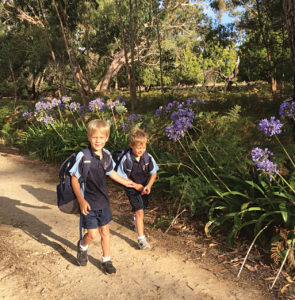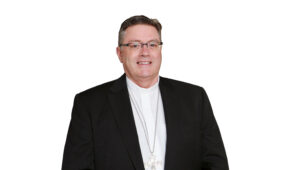Country bus service leaves Catholic school children behind
News
A number of children from Catholic schools in regional South Australia have been denied access to the local school bus two weeks into the first term.

The students were using the bus last year and in most cases the bus goes right past their properties but their parents are now having to drive them to and from school.
With school bus funding identified as a State election issue by Catholic Education SA, The Southern Cross has spoken to parents who say they are “devastated” and “frustrated” by the decision not to allow their children on the bus.
Rachel Manninen said her two eldest children, Joshua, 7, and Jim, 5, had been catching the bus from their home near Nangwarry to Mary MacKillop Memorial School in Penola since 2015 when Joshua started kindergarten.

Joshua and JJim
But recently she was informed by a brief letter from the Penola High School, on behalf of the Department of Education and Child Development (DECD), that the children would no longer be able to catch the bus to and from school.
“I was devastated,” Mrs Manninen said. “The boys are happily settled at Mary MacKillop Memorial – they’ve been to kindy in Penola, then school and OSHC (Out of School Hours Care) and they have very strong relationships with their peers and teachers.”
Advertisement
An old scholar of Mary MacKillop Memorial School, Mrs Manninen said the family had a long association with the school, her mother having taught there and her dad’s great grandmother being one of St Mary MacKillop’s first students.
Mrs Manninen now has to drive her children to and from school, even though she works part-time, is studying a post graduate degree in secondary teaching and has a three-year-old child still at home.
“It’s pretty inconvenient,” she said.
While the nearest public school in Nangwarry is 2km away from the family’s home, Mrs Manninen said it was not possible for the children to walk or ride there. “We live on a main highway where it’s 110kph speed limit and there’s no crossings or bike paths, and there’s no public transport.
“It seems very unfair that if they were going to the public primary school in Penola they would still be on the bus.”
Advertisement
Annabella, 10, and Billie, 6, attending St Joseph’s School in Clare. They caught the bus to and from school last year from their home at Hoyleton, 40km from Clare.
After a week catching the bus this year, Mrs Cash received an email from the local high school, on behalf of DECD, saying her children were no longer able to use the bus because they bypass a nearer government school (Watervale Primary). But she said that only applied to children attending non-government schools as Clare Primary School students who lived closer to Watervale Primary were given an exemption to catch the bus.
Mrs Cash has an 18 month old and works in hospitality in Clare so now has to do the round trip three times. She’s also been trying to start her own business but doesn’t have the time to do that now.

Annabella and Billie
“I was very confused and annoyed when I read the email,” she said. “It’s just so frustrating – it’s over an hour each trip and the youngest child hates the car.
“We are very happy with the school, it’s been good for our girls who have some learning needs; the school picked up on those and transitioned them well when they started there last year.”
Mrs Cash also pointed out that there was no option for families to pay for their children to catch the bus, as there had been when she grew up in the Adelaide Plains.
Two other families from St Joseph’s have been told they can no longer use the bus and there are 23 other passengers from the Catholic school who could be denied access at any time.
Principal of St Joseph’s Primary School Clare, Peter Shearer, stressed the families were not criticising the local high schools which did a great job administering the bus services.
“Their issue is with the DECD Transport Policy itself which discriminates against choice of schooling and school sector,” he said.
Principal of St Columba’s Memorial School in Yorketown said there were also issues around children not being able to catch the bus if it was a pupil-free day for the government school.
Catholic Education SA is urging families to talk to their local MPs about the school bus funding issues and have put information on www.cesa.catholic.edu.au.
“Bus services should be based on need, not school sector,” said CESA director Neil McGoran.
Dr McGoran said SA was the only state where the Minister for Education was responsible for transport of students to and from school. In other states, it was the responsibility of the Minister for Transport and all school students were eligible for the bus.
A spokesperson for the Education Department said all students that resided 5km or more from their nearest appropriate government school were eligible for transport assistance to that school in accordance with the School Transport Policy.
“For ineligible non-government school students, the principal can endorse ineligible students to use a government school bus if seating is available,” she said.
“Larger buses are not provided to accommodate ineligible students, or to take students away from their nearest suitable government school. Ineligible families are required to arrange alternative transport.”
Opposition education spokesperson John Gardner said a Liberal Government would seek to ensure that non-government school students had fair access to school buses in regional areas.
“The Liberal Party does not believe that it is fair that reasonable access to transport is denied to Catholic school students in the country,” he said.
“The review undertaken by the government following the last election was inadequate as it did not start with the presumption that fairness for non-government school students was a desirable outcome. We take a different approach.”
Mr Gardner said the terms of reference for the new review would include potential transfer of school bus management from the Education Department to the Transport Department and allowing all students a guaranteed place on a bus, even if they are attending a non-government school.
Other issues to be covered would be allowing buses to make stops at non-government schools within the area of their current routes, with broader routes to be considered; and wider community use for buses when not performing school runs.








Comments
Show comments Hide comments